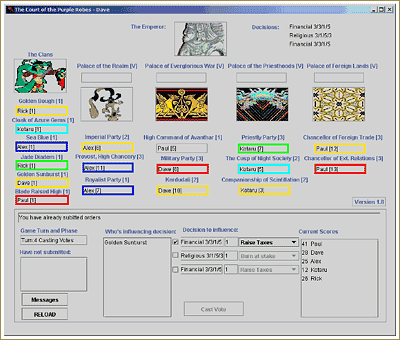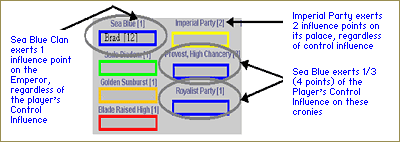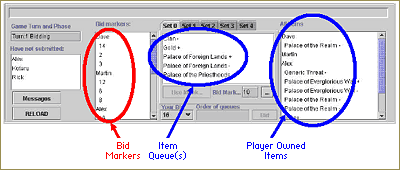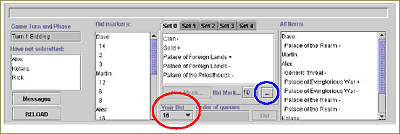The Book of Visitations of Glory
Issue Five
The Court of the Purple Robes
A four to six player game
Concept and Programming by David Dickie
– see http://www.dickieville.net/~ddickie/
EPT background and images by Brad Johnson
The Court of the Purple Robes is a web based multiplayer game that simulates the machinations behind the Court of the Purple Robe, taken from The Court of the Purple Robes from the Imperial courtiers at the Citadel of Avanthár, out of Professor Barker’s .
In the game, players compete to be the power behind the throne, influencing decisions by the Emperor through the various Palaces of Tékumel and through the heads of the major Clans.
Turns are fast, typically under two minutes. Negotiations between players … sometimes less so.

Installation
Court of the Purple Robes runs as a Java 2 executable. To run it, you must be able to run Java 1.3.1 or higher from a command prompt. The easiest way to do this is to download the Java Runtime Environment (JRE) from Sun.
Download JRE 1.3.1 http://java.sun.com/j2se/1.3/jre
Download JRE 1.4 http://java.sun.com/j2se/1.4/download.html
Follow the installation instructions. If you are running on a Linux or Solaris platform, you can download the PurpleRobes.jar file. For Windows 95 or higher, download the self extracting ZIP file PurpleRobes.exe.
Download PurpleRobes.jar
Download PurpleRobes.exe
Extract the files into a directory (the self extracting zip file will automatically insert the files into c:\purple).
Joining a game
Because this is a multiplayer game, there is a game server to which you must be added. As a result, to join a game, you have to contact me at ddickie@ucopian.com.
Starting the game
Open a command prompt (usually under the windows "Start" "Programs" "Accessories" menu) or a terminal window in Unix. Change to the directory in which you installed the program (for instance, "cd c:\purple").Type
java UI.MainDisplay GAMENAME PLAYERNAME
(where GAMENAME is the name of the game, PLAYERNAME is your player name, both previously set up with me). The game communicates with game server via standard HTTP (World Wide Web) protocols, and if you have Web connectivity, the application should start without problems. If it doesn't, try typing "ping ". If the ping fails, you don’t have connectivity to my web server; check your general ability to connect to the internet, and if that works, wait a while (either my server is down or there is a internet problem… either should be fixed within a day). If you have connectivity, copy the text in the command window into an Email and send it to me at ddickie@ucopian.com.
The Main Display
Once the application has started, the Main Display will open. If there are unread game messages or player messages, the Message Display will open as well (see Messages). The Main Display is where you enter your orders for the game. See the following chapters for the different game sequences and what orders may be submitted in each.
Nomenclature
Court Member any individual on the Main Display that can be influenced (has a grey box under their name).
Influence the ability to in some way attempt to move a Court Member or the Emperor to act in a specific way. The attempt may fail, however, due to other, greater influence being applied in some other direction. Note that there are many levels of influence; items influence Court Members, Clans influence Cronies, Cronies influence Advisors, and Advisors and Clans influence the Emperor.
Influence Point the smallest quantity of influence that can be used. In situations where different influences are used to achieve different outcomes, the outcome with the most influence points will win. Note that influence points used to control a Court Member is not the same as the influence they exert; for instance, someone may control the High Commander of Avanthár with 10 influence points, but the High Commander will still only exert 1 influence on the Palace of Everglorious War.
Player influence influence by players, applied by using items or by using influence from controlled Court Members.
Court Member Influence influence by Court Members, which may be used as Player Influence if the Court Member is controlled by a player.
Control box the text box under the Court Member that indicates which player current controls that court member and the amount of influence they are keeping control with.
Control the ability to make a court member exert court member influence in the manner desired by the person with Control, won through applying the most player influence on that court member.
Control Influence the amount of influence by which a player has established control of a Court Member.
Advisor one of four individuals that represent the major palaces of the realm, that is, the Palace of the Realm, the Palace of Everglorious War, the Palace of the Priesthoods, and the Palace of Foreign Affairs.
Clans one of six individuals that represent the great Clans of the Realm, that is, the Golden Bough Clan, the Cloak of Azure Gems Clan, the Blade Raised High Clan, the Blue Sea Clan, the Golden Sun Clan, and the Jade Diadem Clan.
Cronies one of eleven individuals that have special relationships with an Advisor, listed under the associated Advisor. Cronies belong to a Clan, as indicated by the color around the control box.
Player the people playing the game, representing the hidden powers behind the throne.
Bid Marker a numerical value that allows bidding on items, with the highest bid marker always winning. The bid markers are in a linear sequence from 1 to 20.
Item an object that allows a player to influence a Court Member.
Queue a group of items on which a player may bid using a Bid Marker.
Decision an agenda item for which the Emperor must make a decision. Decisions come in different flavors, and depending on the type of decision, the amount of influence exerted by any particular palace will be different.
Casting the tallying of influence on the Emperor to determine what option he will vote for a decision.
Decisions, Clans, Advisors, and Cronies

The Court of the Purple Robes Court Display
The Emperor’s decisions are what drive the empire. The goal of the game, and how players generally get victory points (see Scoring) is to influence the way a decision is voted (yes or no). To be the "power behind the throne," this influence must be indirect, through those the Emperor trusts.
Clans and Advisors influence the Emperor. The clans each exert one influence point on any particular decision. The Advisors (Palaces responsible for different aspects of the Empire’s functions) exert different amounts of influence based on the type of decision being made; the numbers to the right of the decision type are the amount of influence exerted in the same order as the Advisors appear on the Game Board.
Clans also influence Cronies, who typically come from a clan. The relationship between a Clan and a Crony is indicated by the color of the border around the Court Member’s Control Box. A Clan will exert one third of the current Control Influence on cronies from that Clan. For instance, if a player has 9 control influence on the Clan of the Jade Diadem, he will have 3 additional influence for any attempt to control the Priestly Party.
Cronies do not influence the Emperor. They influence the Advisor responsible for a particular palace and make it easier to keep that Advisor / Palace under your control (see Controlling Court Members). Cronies only influence the Advisor for the Palace in which they serve. They are listed under this Advisor. The amount of influence by which a player controls a Crony does not affect the amount of influence the Crony exerts on the Palace. This amount is indicated in brackets after the Cronies name. For instance, the High Commander exerts a "1" influence on the Palace of Everglorius War, regardless of how much influence a player controls the Crony by.
You use items (see Items) to influence any member of the court, be they advisor, crony, or clan.
You use bid markers (see Bid Markers) to get items by bidding on Queues, groups of items.

The player order portion of the display
Items
Items are how you win control of a member of the court. Some items are owned by players (indicated in the "all items" list), while others are unowned. Unowned items are in a queue, where they can be bid on as a group.
Items are either bribes (indicated with a "+") or threats (indicated with a "-"). Some items exert more influence points than others, indicated with a number such as "+2" or "-3." Otherwise the items provide one influence point over the court members they affect. In combination, however, a single point bribe and a threat count double, using the old "carrot and stick" routine. Thus a Clan bribe (Clan +) and Clan threat (Clan -) used together count as 4 influence points instead of two; two of each count as 8 influence points, etc. Higher value bribes and threats cannot be used in combination, so for instance a Clan +2 and a Clan – would be worth 3 points.
Items fall in three categories, general items, specific items, and monkeys. General items (Gold and Generic Threats) may only be used on cronies and clans. Specific items are used on the type of court member indicated. If the specific item is for an Advisor, it also works on that Advisor’s cronies. Monkeys can be used as a bribe on anyone (everyone loves monkeys). Monkeys can also be used to steal items from the biddable item queue (see Queuing Round). Distribution of items is random.
Bid Markers
Bid markers allow you to get items. Bid markers are sequential, starting at 1 and ending at 5 times the number of players. Thus, at the beginning of any bidding sequence, each player will have three bid markers. Initial distribution is slightly random but is intended to keep players reasonably close to balanced. When bidding starts on the biddable item queue, everyone is allowed to bid. The highest bid marker wins. The winning bid goes into the biddable item queue; the winner of the next bid gets that bid marker, but it is not usable until after the next influencing and casting round. As a result, bid marker distribution is more random as the game goes on.
Game Sequence
The game sequence consists of three phases, bidding, influencing, and casting. There can be many bidding rounds before an influencing round. There may be many influencing rounds before a casting round. A casting round always follows the last influencing round. There are as many casting rounds as there are players, then the game ends and the high score wins.
Bidding Round
Each bidding phase starts with X queues, where X is the number of players. Each queue will have a random number (1-8) of random items. During the bidding phase, you pick your bid marker and the order in which you want to bid on the queues. Once everyone has put in orders, the bids are evaluated as follows. Each "first choice" bid is evaluated. If you are the highest bidder for your first choice queue, you win the queue and you're done. Then second choice is evaluated, and so on and so forth. So, if we have queues 1-5, with 1, 2, 3, 4 and 5 gold respectively, and players 1 - 5 with bid markers 1, 2, 3, 4 and 5 respectively, bidding might go as follows:
Player 1 [Bid Marker 1] - Bids on 3, 2, 1, 4, 5 (because it is unlikely they can win 4 or 5)
Player 2 [Bid Marker 2] - Bids on 3, 2, 1, 4, 5
Player 3 [Bid Marker 3] - Bids on 4, 3, 2, 1, 5
Player 4 [Bid Marker 4] - Bids on 5, 4, 3, 2, 1
Player 5 [Bid Marker 5] - Bids on 5, 4, 3, 2, 1
Then, evaluating first choices, Player 5 gets queue 5, Player 3 gets queue 4, Player 2 gets queue 3. Evaluating second choices, player 1 gets queue 2 (player 4 picked 4 but it’s already taken) and, eventually, player 4 gets queue 1 (since they are the only player left and queue 1 is the only queue left).
To set your bid, select your bid marker, then select the item queues in the order you want to try to get them in by pushing the "…" button.
Influencing Round
During the influence round, players use items to gain control of a court member. The amount of influence they exert depends on the number and mix of items used (see "Items"), and additional influence from other members of the court you already control. For Advisors, this is any of the Advisor’s Cronies currently controlled by the player. For Cronies, it is a related Clan currently controlled by the player. Players may take control of a court member away from another player by exceeding the current amount of influence a player has by two.

Players may also increase influence on a court they already control. In this case, the amount of influence exerted is the maximum of the new bid, or the old bid + the new bid divided by two. For instance, if a player controls the Sea Blue Clan with 4 influence, and adds 2 more, the final influence is 4 + 2/2 = 5. If they have 4 influence and add 10, they end up with 4 + 10/2 = 9 (which is less than 10) = 10. The new amount of influence is considered new for this turn.
If several players bid for the same court member on the same round, the highest bid wins. If there are ties for highest bid, a randomly selected player wins. Influencing rounds continue until all players pass. Failed influence attempts still use up items. When all players pass, the game proceeds to the Casting round.
Players may also trade items during the influencing round. Only one trade is allowed for a player in a turn. A trade attempt must be done before an influence attempt. Unless both players trade the exact same items, or if the player doesn't have the item traded, the trade will not succeed. The actual trade completes after any influence attempts.
Remember the following about influencing:
The goal is to influence the Emperor; and only clans and advisors (Palaces) influence the emperor. Cronies can help you gain control of an Advisor, but they do not directly influence the Emperor.
You can, however, get points, and sometimes many, for controlling groups of cronies or a large number of the clans. See "Scoring."
For a crony to help you, you have to control them prior to your attempt to take control of the crony’s boss, so bid for cronies before bidding on their advisor.
You can use multiple items at once to gain control of someone. If you use a "+" and "-" item at the same time, they count as 4 instead of 2 (and 2 of each will be 8 etc. etc).
You want as much influence (control) over people as possible to keep others from grabbing them away from you.
You can up your influence amount on someone, but you only get half the new amount, unless that would be less than the new amount.
Influence degrades after the influence round, but it doesn't disappear in all cases. Advisor influence goes away, Clans are reduced by 66%, so a "3" control would reduced to a "1." Cronies are reduced by 33%, so a "3" control would be reduced to a "2."
Casting Round
During the casting round, players use the court members under their control to influence the Emperor to vote a particular way on a decision. There is only one round. Players may vote all court members they control the same way, or they may vote different ways for different members or groups of members. At the end of the casting round, victory points are awarded (see "Scoring"). After the casting round, control on court members changes as follows. All existing influence on advisors is removed (they have short memories). Clans are reduced by 66%, so a "3" control would reduced to a "1." Cronies are reduced by 33%, so a "3" control would be reduced to a "2."
It is important to work with other players during the casting round. For instance, on a Financial Decision, the player who controls the Palace of Foreign Affairs will have 5 influence points on the vote. Suppose they select "Raise Taxes." If one player with the Palace of the Realm (with 3 influence points) and two other players with three clans between them vote for "Lower Spending," the first player will get nothing, while the player with the Palace of the Realm will get 6 points, and the players with the clans will get 1 point apiece.
Scoring
Players score after the casting round as follows:
Most influence for winning a vote (no tie): 4 + the number of other players that voted the same way.
Most influence for winning a vote (one or more players tied): 2 + number of other players that voted the same way (of which there will always be at least one).
Voted the same way as the winning vote: 1
Control all advisors: 12
Control all cronies of one advisor: 3
Control all clans: 8
Control 3-5 clans: 3
Messages
Game messages and player messages are displayed in the Message Window. The message window will be displayed automatically when you start the game if there are waiting messages. It can be redisplayed at any time with the "Messages" button on the main display. You may clear messages with the "clear" button. You may add player messages with the "Post" or "Post Anonymous" button after entering some text in the new message text area.
Notes on entering orders with the Main Display
The main display consists of two pieces, the Court Display and the Player Order Display. The Court Display shows the court members, and any current control of those members. The amount of influence the court member is controlled by is indicated as well. The Player Order Display shows the current status of the item queues, player owned items, current scores, and other things needed to make decisions for a particular game phase. The Player Order Display changes based on what phase the game is in.
On the Player Order Display, options that are not available are typically disabled.
When you have entered an order that completes your turn, a message is displayed, "you have already entered orders." Until all other players have submitted orders and that particular round, this message will continue to be displayed. While in this state, the only action a player may take is to send messages using the Message Display.
In some cases, orders can be automatically generated for you (if you have no items in the Influence phase or no advisors / clans under your control in the Casting phase).
In cases where you may enter multiple items (using multiple items to influence one person, having several controlled court members vote a single way), use a left mouse click to select one item, shift-click to select a range of items, and control-click to select a set of items.
If you want to refresh data after submitting orders, or to see any other actions that have occurred since you started COPR, use the "reload" button on the main display.
Notes on technical implementation
In order to provide as simple and universal a communications method as possible, standard web protocols (HTTP and CGI-BIN) have been used for the game’s communications layer. This results in delays of up to a minute in processing orders. After submitting orders, wait a minute before using the "reload" button.
